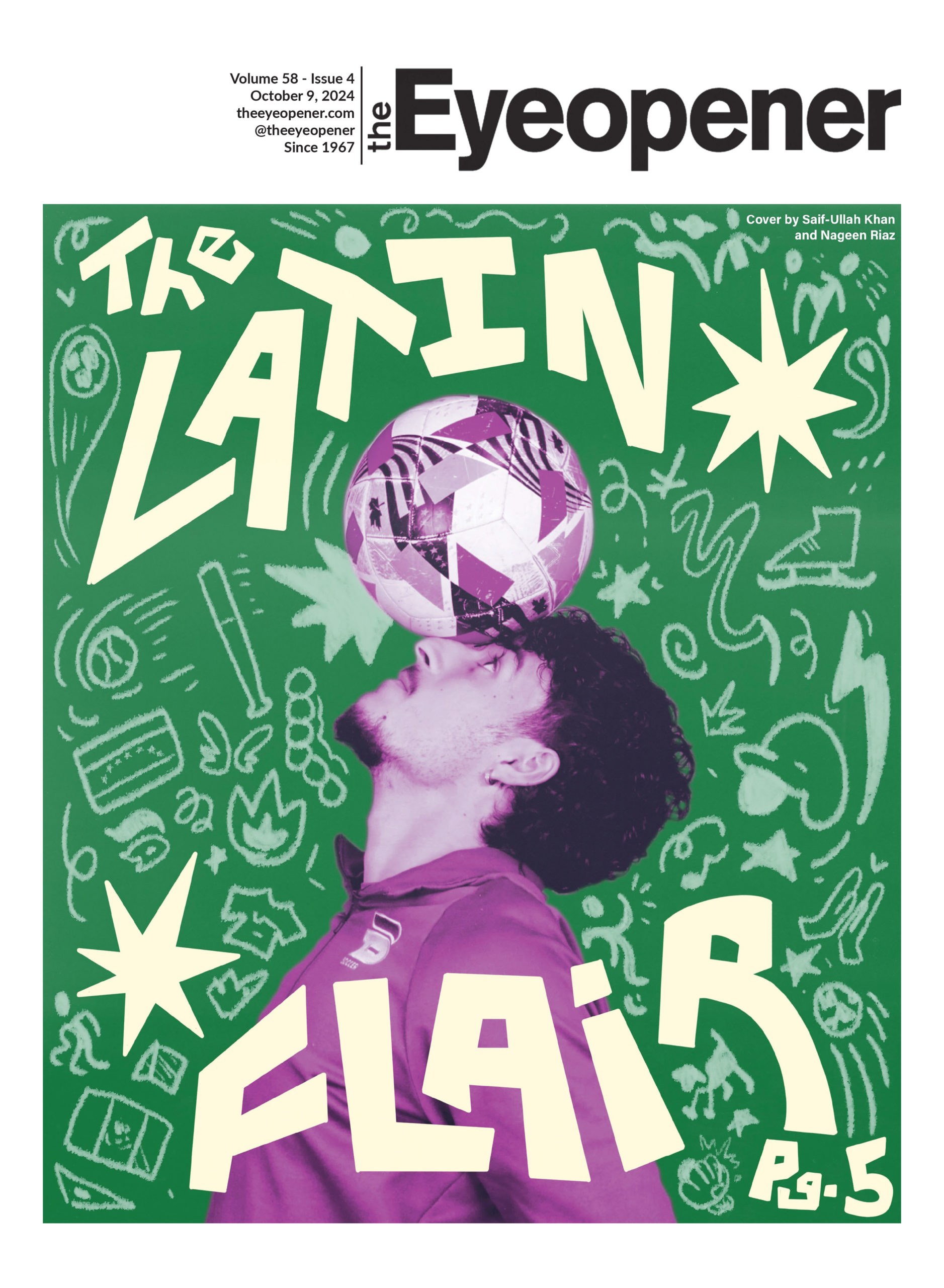Words by Nalyn Tindall
Visuals by Brithi Sehra
T
rudging through what seems like a never-ending winter storm, her feet engulfed in thick white snow reaching her ankles, Maanya Kohli finds herself delivering what would likely be her last order. The second-year professional communications student has been delivering for Uber Eats on-foot for three months. This bitterly cold day calls for high demand and high rates, thanks to unruly weather conditions.
“I don’t know why I’m doing this,” she tells her boyfriend over the phone, on the verge of tears while delivering someone’s take-out order. “I cannot believe I’m doing this. I cannot do this anymore.”
Five months after arriving in Canada, nearing the end of her contract for an expiring seasonal retail position, Kohli found herself signing up for the food delivery app with the promise of flexibility and easy money on the line.
Uber Eats seemed like the perfect job for an international student like her trying to balance their studies and make ends meet—but she quickly realized that this wasn’t the case and soon became aware of how difficult it is to earn money through these services.

She explains that on average, an order can pay between five to 10 dollars but sometimes earns her as little as three dollars, despite taking over half an hour to deliver. She says that the majority of her income relied on tips–which were inconsistent and unreliable. Many who are ordering these deliveries don’t realize the importance of the tipping option that pops up on their screen.

“So many people literally do not know,” notes Kohli. She sees this pay model as exploitative—as no minimum wage is guaranteed—and feels it takes advantage of people who have no other option but to work in these roles.
“You give a lot, mentally and physically. But you’re not getting the compensation for that,” says Kohli, explaining the demanding nature of the job. She notes that it proved impossible for her to find work at certain times despite her open availability. Kohli spent hours on end waiting for a single offer to come through and had no luck. This meant taxing periods of frequent orders, such as during inclement weather, were her only opportunities to make money.
In today’s rapidly evolving job market, the gig economy has emerged as a dominant force, significantly impacting the lives of students.
Gig work is defined by Oxford Languages as “temporary or freelance work performed by an independent contractor on an informal or on-demand basis.”
For some, this decentralized workforce offers a tantalizing commitment to adaptability—the ability to balance work with academic demands. Yet, for many students, the allure of high rewards advertised by the gig economy proves elusive and ultimately unattainable.
On-demand and flexible work of this nature can be a double-edged sword for students. On one hand, it can be a lifeline, allowing them to earn income on their own terms. This flexibility can be invaluable, especially for those juggling coursework, internships and extracurricular commitments. However, the underbelly of the gig economy reveals a harsh reality: its exploitative nature.
While flexibility may seem like an attractive feature, it often masks the absence of job security, fair wages and essential benefits. Viet Vu, the manager of economic research at TMU’s The Dais, says that, “by relying on that flexibility, you also give up on the additional job protection.”
According to Statistics Canada, approximately 34 per cent of gig workers have completed some post-secondary education, meaning that current or past students make up a significant portion of the industry. This highlights the need for targeted support and policies to address the unique challenges and opportunities presented by the growing involvement of well-educated individuals in non-traditional work arrangements.

For many students, the gig economy is a precarious tightrope walk. They’re lured in under the guise of independence and high rewards but are frequently left grappling with instability and a lack of safety and financial insecurity. In this delicate balancing act, how much can be sacrificed before someone slips?

A
fter falling and scraping her leg open on the pavement, third-year creative industries student Rachel* worries more about how her boss would react to the inconvenience than the blood dripping down her leg. Sitting right outside the staff entrance, Rachel fears she’ll be reprimanded for her tears.
She’s hesitant to go inside but eventually has to, “I’m not just gonna sit outside and let my leg bleed,” she thinks to herself. After stepping through the door, still visibly injured and upset, her boss asks why she’s crying and why she’s late. When she explains the situation and asks for help, he simply states that it wasn’t that bad.
The appearance she presents to the clients is more important than her injury—only confirming her fears.

Fear isn’t an uncommon workplace emotion for Rachel. She recounts constantly being worried she’ll be fired—or rather stop having shifts offered to her—for the smallest reasons. These reasons include anything from the colour of her socks or nail polish to spilling drinks. She recalls any time she was penalized as extremely “passive-aggressive,” noting a looming feeling of replaceability in her role. “We’re being fired because they could hire somebody else and just offer them jobs very easily.”
The hospitality industry is associated with secure positions which may rely on supplementary pay via tips. However, some workers both rely on tips and lack job security—Rachel is one of these people. Hired by a staffing agency, Rachel worked as a server at multiple venues throughout the Greater Toronto Area (GTA) during the summer.
She found herself bouncing between roles with little to no notice or consideration from her employer. As a “floater,” she would often be called in for work without a job to fulfill. Rachel would then be left sitting and waiting for hours to see if a position would open up before being sent home, only being paid the minimum hourly wage when expecting to make tips. Other times, she was told she would be working a high-paying role only to be moved to another position with significantly less pay. She was never able to properly prepare for the shift ahead, arriving in the wrong attire or without essentials due to last-minute swaps.
This inconsistency and unreliability left Rachel frustrated and stressed as she never knew what to expect or even relatively how much money she would be making each day. She says the lack of communication made her feel extremely undervalued and underappreciated.
The only reason she continued to return was because of the days when she did make a sustainable amount of money.
As a hostess in the suites at a local stadium, she could make a considerable amount thanks to some generous tips. But these shifts were few and far between, a beacon of light amongst the stress and fear she faced during the rest of each stretch of work. According to Georges El Hajal & Bill Rowson in Research in Hospitality Management, “Many of today’s permanent hospitality jobs will be lost to gig workers.” They argue that due to increased labour shortages brought on by the pandemic, gig workers are being used to fill these roles. In the future, the hospitality industry may turn to this model of flexible, on-demand jobs where the employer holds less accountability and the employee carries increased risk and responsibility.
Upon her arrival at the stadium, Rachel is told by her supervisor, “You’re gonna go bartend in one of the most premium places in the whole stadium.” Despite never bartending before, Rachel is enthusiastic to learn something new. She informs her supervisor about her lack of experience but is assured she’ll pick up the job easily and have someone bartending alongside her, guiding her through the shift.
Once she steps behind the premium lounge bar, she realizes exactly what the shift ahead holds for her: stress, tears and anger. With a never-ending onslaught of orders coming her way, all of which are asking for drinks she doesn’t know how to make, completely overwhelmed, Rachel breaks down. The hoard of angry servers seems apathetic to the fact she received no training, scolding her for her inexperience.
This isn’t a unique situation for Rachel either, she notes that she received little to no training in any of the positions she was placed in, relying on her coworkers to help her and eventually figuring out each job on her own.
Vu says, “It’s no surprise at all that, coupled with the high cost of living in a city like Toronto, [gig work] puts a lot of these students into precarity.”
According to Mercer’s Cost of Living Survey, Toronto is currently the most expensive city in Canada to live in. This survey “measures the comparative cost of more than 200 items in each location, including housing, transportation, food, clothing, household goods, and entertainment.”
The high cost of living means gig work may be essential for many students to get by as its flexibility offers an avenue for those with other commitments to still have an income.

S
ome students are using the gig economy as a device for their own entrepreneurial and creative ventures. Carina Bianchini, a third-year professional music student, can be found performing at nightclubs and venues from the downtown core to the edges of the GTA.
Alongside being a singer-songwriter, she is also her own manager, referring to herself as a “one-woman show” both on and off of the stage. She’s created a system to secure gigs and make money from her music. This requires dedication and hard work, reaching out to venues and promoters and ensuring she’s on top of communication months in advance.
For Bianchini, her income typically relies on the number of tickets sold for each show. She negotiates a percentage of these sales when booking each gig, but sometimes, there’s “unprofessionalism,” she says. “There’s been a couple times where I haven’t been told what percentage of ticket sales I’m getting. So I’m just booked for the show, and I know I’m getting some portion, but I’m not told,” says Bianchini.
She expresses feeling uneasy about asking and would prefer if everyone involved was transparent, noting communication is often the biggest issue she faces when booking work herself.
According to Disctopia, “About 70% of independent artists generate less than $10,000 from their music annually. As an indie artist relying on streaming revenues, you’ll need about 3,000,000 streams annually to generate about $12,000.” This translates to 3 million streams annually for $16,200 CAD. Balancing her musical career with academics has been a stressful experience for Bianchini with constant pressure to stay on top of both pursuits. She also finds herself comparing her success with those around her, especially online. “It’s hard not to compare myself but I always just tell myself I’m constantly growing. Even if it’s slow and steady, maybe one day I will blow up.”
Another key issue surrounding gig work is the lack of protection for employees. Vu says, “many vulnerable communities don’t often have access to these full-time jobs, so they’re forced into these sort of contractual agreements that [are] really not good for protecting their labour rights.” He explains that these rights include vacation pay, sick leave, health benefits and any other benefits which are tied to your job and included under the Employment Standards Act.
Gig Workers United (GWU) is a community union supported by the Canadian Union of Postal Workers whose mission is to guarantee transparent pay, livable wages, improved health and safety conditions and labour protections for delivery couriers through organization of workers.
GWU president Jennifer Scott says, “Being a misclassified worker, we don’t have access to safety nets when we’re injured at work, so we don’t have benefits. [They’re] incredibly difficult to access.”
According to the Government of Canada, “Misclassification occurs when an employer does not consider or treat a person who is an employee, as an employee.” GWU is demanding that all workers have full employment rights with “no carve-outs” from minimum wage, sick leave, vacation pay and other minimum employment standards, as well as equal access to employment insurance, pension plans and injury compensation.
Kohli explains that many international students face limited options for employment when arriving in Canada. As some were unable to work in their home countries due to age restrictions, they come to a new country with no experience on their resumes.
When competing against Canadians who have had part-time jobs as teenagers, many find it difficult to be employed, even in minimum-wage roles. This causes them to turn to gig work, where the hiring process is much more lenient.

Vu says universities “increasingly see international students as a source of revenue as opposed to students that deserve financial support.”
Kohli feels that universities can do more to support students financially so they don’t have to turn to unreliable sources of income that can put them in harm’s way. Especially for international students who pay over three times the amount of tuition fees.
Though the university has initiatives geared towards financial aid, offering programs including AwardSpring and Career Boost, many of the positions offered are not available to international students.
Kohli says, “I don’t understand why there has to be a divide, at least inside the university.”
Now that her time with Uber Eats is over, Kohli still feels uneasy about the system she’s left behind and hopes for a complete overhaul of the company’s pay model, calling for a fairer compensation system for gig workers. She warns others that what may appear as easy money may not be, encouraging other students to exhaust all of their other employment options first.
Kohli’s experience reflects many of the issues with the gig economy at large, where flexibility often conceals exploitation and financial instability. She notes that while she’s no longer being exploited, her peers and many others continue to be. “If I don’t do it, someone else will have to.”
*The source’s last name is not mentioned due to privacy concerns.










Leave a Reply